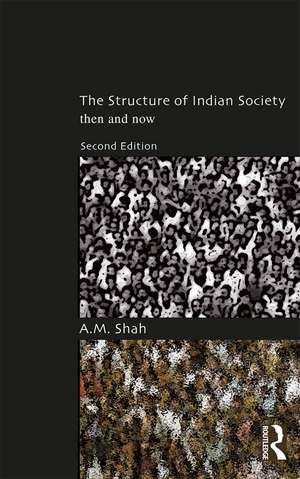The Structure of Indian Society: Then and Now
Autor A.M. Shahen Limba Engleză Paperback – 9 apr 2019
- Interrogates the prevailing thinking in Indian sociology on these structures;
- Studies Indian society from contemporary as well as historical perspectives;
- Analyses caste divisions vis-à-vis caste hierarchy;
- Critically examines the public policies regarding caste-less society, reservations for Backward Classes, and the caste census.
| Toate formatele și edițiile | Preț | Express |
|---|---|---|
| Paperback (1) | 363.84 lei 6-8 săpt. | |
| Taylor & Francis – 9 apr 2019 | 363.84 lei 6-8 săpt. | |
| Hardback (1) | 1000.27 lei 6-8 săpt. | |
| Taylor & Francis – 20 iul 2022 | 1000.27 lei 6-8 săpt. |
Preț: 363.84 lei
Nou
Puncte Express: 546
Preț estimativ în valută:
69.63€ • 72.60$ • 57.87£
69.63€ • 72.60$ • 57.87£
Carte tipărită la comandă
Livrare economică 20 martie-03 aprilie
Preluare comenzi: 021 569.72.76
Specificații
ISBN-13: 9780367193195
ISBN-10: 0367193191
Pagini: 248
Dimensiuni: 138 x 216 x 15 mm
Greutate: 0.31 kg
Ediția:2nd edition
Editura: Taylor & Francis
Colecția Routledge India
Locul publicării:Oxford, United Kingdom
ISBN-10: 0367193191
Pagini: 248
Dimensiuni: 138 x 216 x 15 mm
Greutate: 0.31 kg
Ediția:2nd edition
Editura: Taylor & Francis
Colecția Routledge India
Locul publicării:Oxford, United Kingdom
Public țintă
PostgraduateCuprins
Introduction 1. Caste in the 21st Century: From System to Elements 2. Purity, Impurity, Untouchability: Then and Now 3. Sanskritization Revisited 4. Sects and Hindu Social Structure 5. The Rural–Urban Networks in India 6. The ‘Dalit’ Category and Its Differentiation 7. Can the Caste Census be Reliable? 8. Division and Hierarchy: An Overview of Caste in Gujarat 9. Untouchability, the Untouchables and Social Change in Gujarat 10. The Tribes — So-called — of Gujarat: In the Perspective of Time 11. The Mirage of a Casteless Society in India 12. A Government Programme to Train Scheduled Caste Priests 13. The Village in the City, the City in the Village 14. Myths, Rural and Urban
Notă biografică
A.M. Shah is former Professor of Sociology at the Delhi School of Economics, University of Delhi, and National Fellow of the Indian Council of Social Science Research, New Delhi, India. Felicitated with the Lifetime Achievement Award by the Indian Sociological Society in 2009, he has also been the recipient of the Swami Pranavananda Award from the University Grants Commission, and the Distinguished Service Award from the University of Delhi. He has held fellowships at the University of Chicago; the Centre for Advanced Study in the Behavioural Sciences, Stanford; the Institute of Development Studies, Sussex, UK; and the University of New England, Australia. He has authored and edited many books, including The Household Dimension of the Family in India (1973); Division and Hierarchy (co-authored with I.P. Desai (1988); The Family in India: Critical Essays (1998); Exploring India’s Rural Past (2002); The Writings of A. M. Shah: the Household and Family in India (an omnibus, 2014); and Sociology and History (2017). He has contributed extensively to academic journals and symposia, including ten articles in Gujarati. He has been honoured with a festschrift, Understanding Indian Society: Past and Present (2010), edited by B.S. Baviskar and Tulsi Patel.
Recenzii
"This book forces its reader to revisit the Indian society as it exists today… [it] comes as a fresh guide for young sociologists in understanding the Indian social structure in a refreshing and befitting academic framework." — Rajesh Gill, Sociological Bulletin
"Shah’s articles open up some less trodden paths in the study of India." — Sirpa Tenhunen, Journal of the Royal Anthropological Institute
"Shah’s articles open up some less trodden paths in the study of India." — Sirpa Tenhunen, Journal of the Royal Anthropological Institute
Descriere
This book examines how Indian society has proliferated through an amalgamation of institutions and practices which has divided and united people across communities. This edition is a key text for students and scholars of sociology and social anthropology, political science, and South Asian studies.
